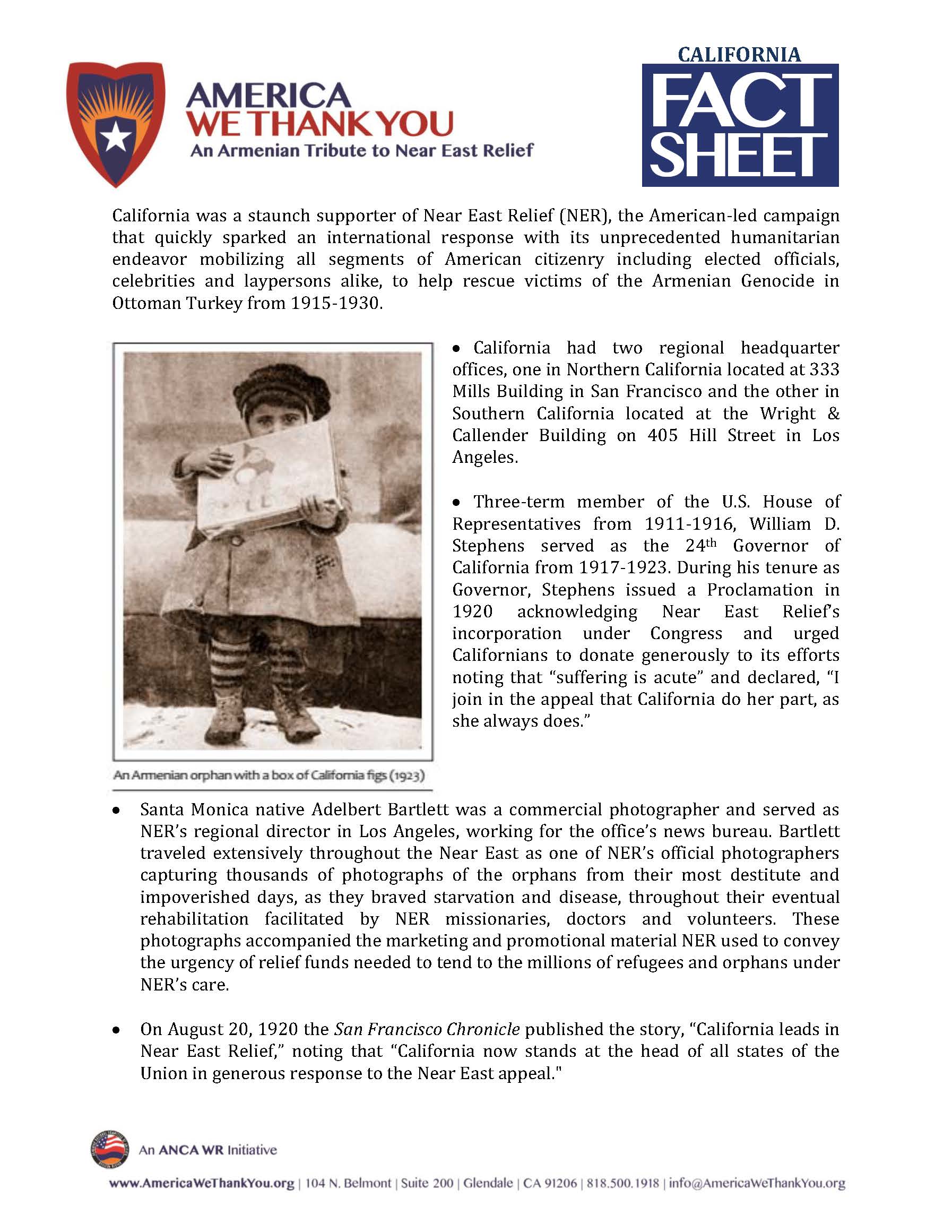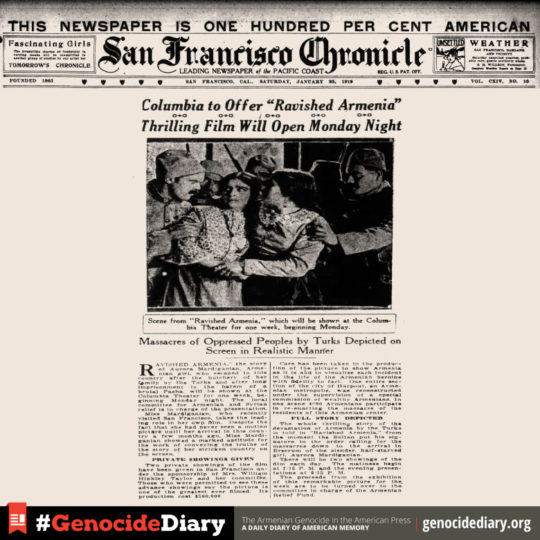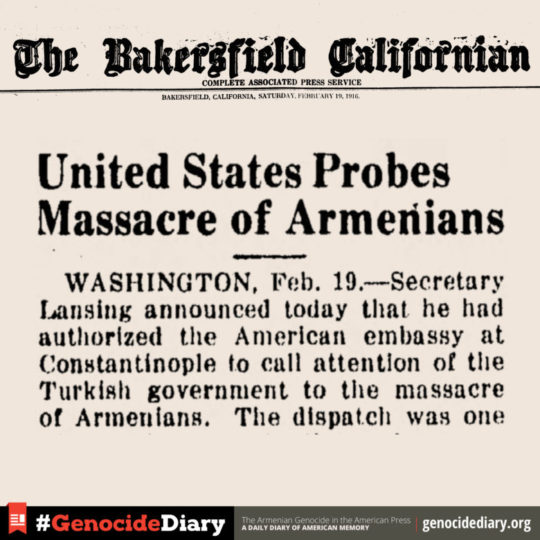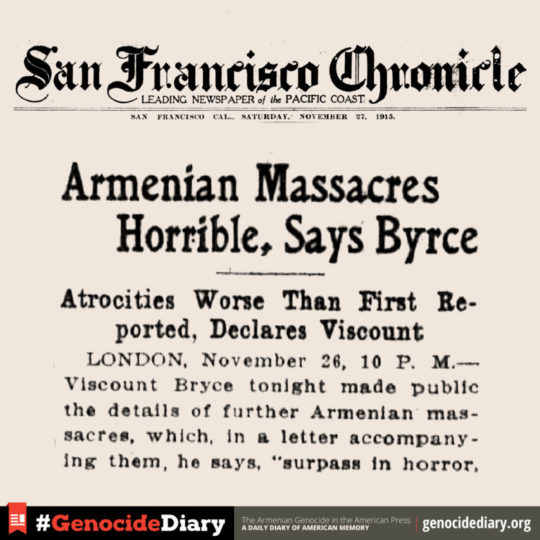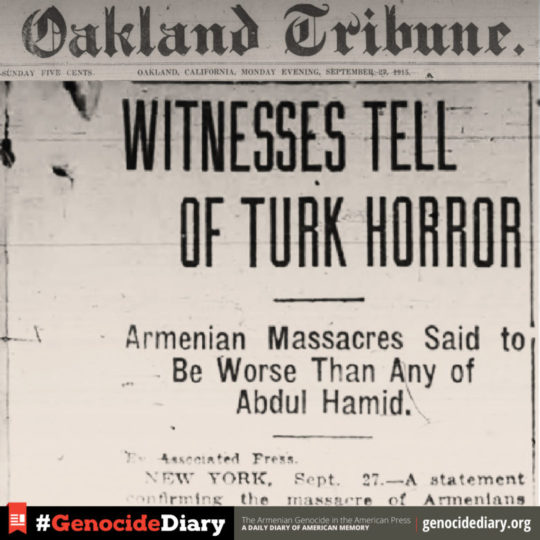Assembly Bill No. 1915
State of California
September 18, 2014
CHAPTER 414
An act to amend Sections 51220 and 51226.3 of the Education Code, relating to pupil instruction.
[Approved by Governor September 18, 2014. Filed with Secretary of State September 18, 2014.]
legislative counsel’s digest
AB 1915, Nazarian. Pupil instruction: social sciences: Armenian Genocide.
Existing law requires the adopted course of study for grades 7 to 12, inclusive, to offer courses in specified areas of study, including social sciences. Existing law requires the instruction in social studies to provide instruction in, among other things, human rights issues, with particular attention to the study of the inhumanity of genocide, slavery, and the Holocaust.
This bill would enact the Armenian Genocide Education Act, and would provide that the instruction in human rights issues may also include particular attention to the study of the inhumanity of the Armenian Genocide.
Existing law requires the State Department of Education to incorporate materials relating to civil rights, human rights violations, genocide, slavery, and the Holocaust into publications that provide examples of curriculum resources, consistent with the subject frameworks on history and social science and other requirements. Under existing law, the Legislature encourages the incorporation of survivor, rescuer, liberator, and witness testimony into the teaching of human rights, genocide, and the Holocaust. Existing law establishes the Instructional Quality Commission and requires the commission to, among other things, recommend curriculum frameworks to the State Board of Education.
This bill would encourage the department to incorporate materials relating to the Armenian, Cambodian, Darfur, and Rwandan genocides into publications that provide examples of curriculum resources, consistent with the subject frameworks on history and social science. The bill would require the commission to consider including the Armenian, Cambodian, Darfur, and Rwandan genocides in the recommended history-social science curriculum framework when the history-social science curriculum framework is revised as required by law. The bill would also specify that the Legislature encourages the incorporation of survivor, rescuer, liberator, and witness oral testimony, as defined, into the teaching of human rights, the Holocaust, and genocide, including the Armenian, Cambodian, Darfur, and Rwandan genocides.
This bill would incorporate additional changes in Section 51226.3 of the Education Code, proposed by SB 1380, to be operative only if SB 1380 and this bill are chaptered and become effective on or before January 1, 2015, and this bill is chaptered last.
The people of the State of California do enact as follows:
SECTION 1. This act shall be known, and may be cited, as the Armenian Genocide Education Act.
SEC. 2. Section 51220 of the Education Code is amended to read: 51220. The adopted course of study for grades 7 to 12, inclusive, shall
offer courses in the following areas of study:
English, including knowledge of and appreciation for literature, language, and composition, and the skills of reading, listening, and
(1) Social sciences, drawing upon the disciplines of anthropology, economics, geography, history, political science, psychology, and sociology, designed to fit the maturity of the pupils. Instruction shall provide a foundation for understanding the history, resources, development, and government of California and the United States of America; instruction in our American legal system, the operation of the juvenile and adult criminal justice systems, and the rights and duties of citizens under the criminal and civil law and the State and Federal Constitutions; the development of the American economic system, including the role of the entrepreneur and labor; the relations of persons to their human and natural environment; eastern and western cultures and civilizations; human rights issues, with particular attention to the study of the inhumanity of genocide, slavery, and the Holocaust, and contemporary issues.
(2) For purposes of this subdivision, genocide may include the Armenian Genocide. The “Armenian Genocide” means the torture, starvation, and murder of 1,500,000 Armenians, which included death marches into the Syrian desert, by the rulers of the Ottoman Turkish Empire and the exile of more than 500,000 innocent people during the period from 1915 to 1923, inclusive.
Foreign language or languages, beginning not later than grade 7, designed to develop a facility for understanding, speaking, reading, and writing the particular language.
Physical education, with emphasis given to physical activities that are conducive to health and to vigor of body and mind, as required by Section 51222.
Science, including the physical and biological aspects, with emphasis on basic concepts, theories, and processes of scientific investigation and on the place of humans in ecological systems, and with appropriate applications of the interrelation and interdependence of the sciences.
Mathematics, including instruction designed to develop mathematical understandings, operational skills, and insight into problem-solving procedures.
Visual and performing arts, including dance, music, theater, and visual arts, with emphasis upon development of aesthetic appreciation and the skills of creative
Applied arts, including instruction in the areas of consumer and homemaking education, industrial arts, general business education, or general
Career technical education designed and conducted for the purpose of preparing youth for gainful employment in the occupations and in the numbers that are appropriate to the personnel needs of the state and the community served and relevant to the career desires and needs of the
Automobile driver education, designed to develop a knowledge of the provisions of the Vehicle Code and other laws of this state relating to the operation of motor vehicles, a proper acceptance of personal responsibility in traffic, a true appreciation of the causes, seriousness, and consequences of traffic accidents, and to develop the knowledge and attitudes necessary for the safe operation of motor vehicles. A course in automobile driver education shall include education in the safe operation of
Other studies as may be prescribed by the governing board. SEC. 3. Section 51226.3 of the Education Code is amended to read:
51226.3. (a) (1) The department shall incorporate into publications that provide examples of curriculum resources for teacher use those materials developed by publishers of nonfiction, trade books, and primary sources, or other public or private organizations, that are age-appropriate and consistent with the subject frameworks on history and social science that deal with civil rights, human rights violations, genocide, slavery, and the Holocaust.
(2) The Legislature encourages the department to incorporate into publications that provide examples of curriculum resources for teacher use those materials developed by publishers of nonfiction, trade books, and primary sources, or other public or private organizations, that are age-appropriate and consistent with the subject frameworks on history and social science that deal with the Armenian, Cambodian, Darfur, and Rwandan genocides.
(1) The Legislature encourages the incorporation of survivor, rescuer, liberator, and witness oral testimony into the teaching of human rights, the Holocaust, and genocide, including, but not limited to, the Armenian, Cambodian, Darfur, and Rwandan
(2) As used in this subdivision, “oral testimony” means the firsthand accounts of significant historical events presented in a format that includes, but is not limited to, in-person testimony, video, or a multimedia option, such as a DVD or an online video.
The Legislature encourages all state and local professional development activities to provide teachers with content background and resources to assist them in teaching about civil rights, human rights violations, genocide, slavery, the Armenian Genocide, and the
The Legislature encourages all state and local professional development activities to provide teachers with content background and resources to assist them in teaching about the Great Irish Famine of 1845–50.
The Great Irish Famine of 1845–50 shall be considered in the next cycle in which the history-social science curriculum framework and its accompanying instructional materials are
When the history-social science curriculum framework is revised as required by law, the Instructional Quality Commission shall consider including the Armenian, Cambodian, Darfur, and Rwandan genocides in the recommended history-social science curriculum
The Model Curriculum for Human Rights and Genocide adopted by the state board, pursuant to Section 51226, shall be made available to schools in grades 7 to 12, inclusive, as soon as funding is available for this In addition, the department shall make the curriculum available on its Internet Web site.
For purposes of this article, “Armenian Genocide” means the torture, starvation, and murder of 1,500,000 Armenians, which included death marches into the Syrian desert, by the rulers of the Ottoman Turkish Empire and the exile of more than 500,000 innocent people during the period from 1915 to 1923,
SEC. 3.5. Section 51226.3 of the Education Code is amended to read:
51226.3. (a) (1) The department shall incorporate into publications that provide examples of curriculum resources for teacher use those materials developed by publishers of nonfiction, trade books, and primary sources, or other public or private organizations, that are age-appropriate and consistent with the subject frameworks on history and social science that deal with civil rights, human rights violations, genocide, slavery, and the Holocaust.
(2) The Legislature encourages the department to incorporate into publications that provide examples of curriculum resources for teacher use those materials developed by publishers of nonfiction, trade books, and primary sources, or other public or private organizations, that are age-appropriate and consistent with the subject frameworks on history and social science that deal with the Armenian, Cambodian, Darfur, and Rwandan genocides.
(1) The Legislature encourages the incorporation of survivor, rescuer, liberator, and witness oral testimony into the teaching of human rights, the Holocaust, and genocide, including, but not limited to, the Armenian, Cambodian, Darfur, and Rwandan
(2) As used in this subdivision, “oral testimony” means the firsthand accounts of significant historical events presented in a format that includes, but is not limited to, in-person testimony, video, or a multimedia option, such as a DVD or an online video.
The Legislature encourages all state and local professional development activities to provide teachers with content background and resources to assist them in teaching about civil rights, human rights violations, genocide, slavery, the Armenian Genocide, and the
The Legislature encourages all state and local professional development activities to provide teachers with content background and resources to assist them in teaching about the Great Irish Famine of 1845–50.
The Great Irish Famine of 1845–50 shall be considered in the next cycle in which the history-social science curriculum framework and its accompanying instructional materials are
When the history-social science curriculum framework is revised as required by law, the Instructional Quality Commission shall consider including the Armenian, Cambodian, Darfur, and Rwandan genocides in the recommended history-social science curriculum
The Model Curriculum for Human Rights and Genocide adopted by the state board, pursuant to Section 51226, shall be made available to schools in grades 7 to 12, inclusive, as soon as funding is available for this In addition, the department shall make the curriculum available on its Internet Web site.
For purposes of this article, “Armenian Genocide” means the torture, starvation, and murder of 1,500,000 Armenians, which included death marches into the Syrian desert, by the rulers of the Ottoman Turkish Empire and the exile of more than 500,000 innocent people during the period from 1915 to 1923,
SEC. 4. Section 3.5 of this bill incorporates amendments to Section
51226.3 of the Education Code proposed by both this bill and Senate Bill 1380. It shall only become operative if (1) both bills are enacted and become effective on or before January 1, 2015, (2) each bill amends Section 51226.3 of the Education Code, and (3) this bill is enacted after Senate Bill 1380, in which case Section 3 of this bill shall not become operative.

